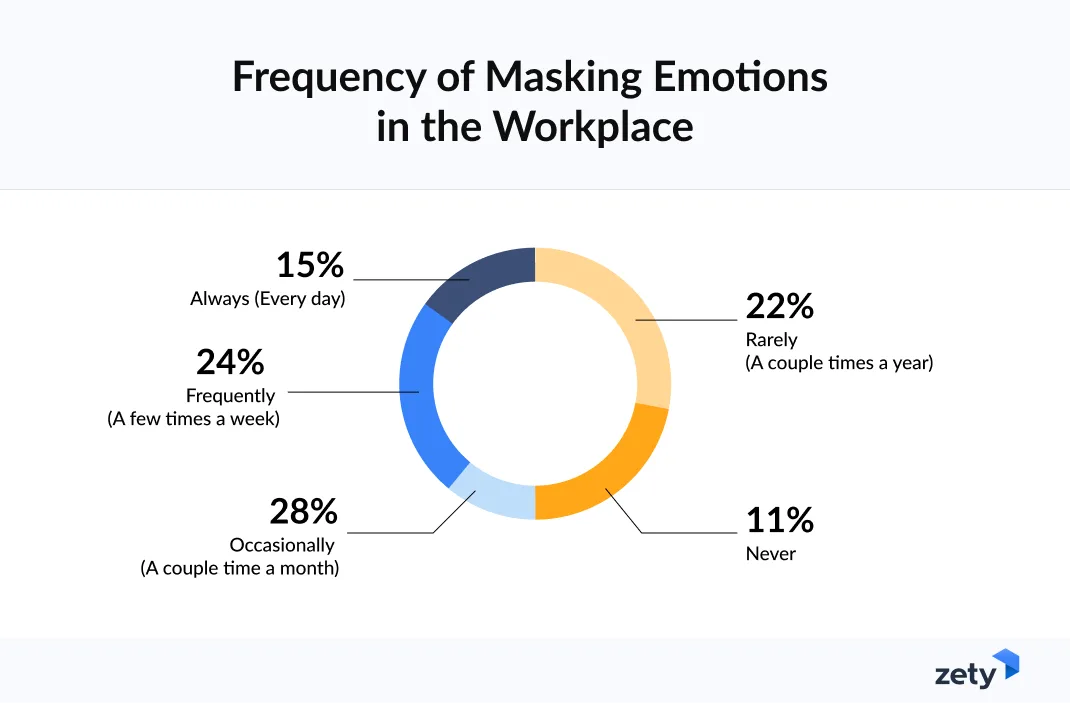1 in 3 Employees Have Cried at Work, Most Feel Pressure to Hide
Create Your Resume Now
Employees are navigating workplaces where expressing emotions can feel risky, leaving many to hide their struggles and suffer in silence. Zety UK has released findings from its Workplace Emotional Safety Report, revealing the stressors, emotional pressures, and barriers to psychological safety affecting workers.
The survey of over 1,000 U.S. employees highlights workplace emotional trends and challenges relevant to organisations worldwide. Research shows just 32% rate the overall psychological safety of their workplace as high, while 67% have felt the need to ‘mask’ their emotions to appear professional – a phenomenon Zety calls ‘corporate masking.’ If their mental health were suffering, 1 in 4 wouldn’t feel safe telling their manager and would stay silent.
Additional Key Findings
- 44% feel judged when they express stress or negative emotion at work.
- Burnout or chronic stress (43%) and heavy workloads or deadlines (42%) are the leading causes of negative emotions at work.
- 36% have reported a different reason for taking a mental health day; 7% don’t feel comfortable taking time off for mental health at all.
- One-third have been told directly to “toughen up,” “calm down,” or “leave your feelings at the door.”
The State of Psychological Safety
The data shows hesitation around whether employees can truly be themselves at work without fear of consequences:
- 67% have felt the need to mask or hide their emotions to appear professional.
- 1 in 3 employees feel uncomfortable expressing negative emotions at work.
- Just 32% rate their workplace’s psychological safety as high, while 58% rate it moderate and 10% rate it low.

What this means: Employees are cautious about lowering their guard at work. The numbers suggest that most people operate with a sense of restraint, which limits genuine connection and transparency. Environments that don’t feel fully safe can make employees hesitant to share ideas, voice concerns, or admit struggles.
Emotional Strain and Burnout
The toll of stress on employees is clear:
- 61% have felt overwhelmed to the point of tears in the past year.
- 30% have cried in front of a coworker or manager due to work stress.
- 1 in 4 feel emotionally drained a few times per week, and 1 in 10 say they feel this way every day.
Other main causes of negative emotions at work include:
- Conflict with manager or colleagues (29%)
- Lack of support or recognition (28%)
- Personal issues spilling into work (26%)
- Unclear communication or expectations (23%)
- Toxic team or leadership culture (23%)
- Job insecurity or fear of layoffs (14%)
- Sudden changes in responsibilities (14%)
- Micromanagement or lack of autonomy (10%)
- Ethical or values conflict (8%)
- Discrimination or harassment (7%)
What this means: The workplace is taking an emotional toll that goes beyond occasional stress. High levels of overwhelm and fatigue point to a pattern of unsustainable pressure. Left unaddressed, this climate normalizes exhaustion and diminishes both morale and performance.
Barriers to Emotional Expression
Employees often hold back their feelings when past attempts have been invalidated or minimized:
- 44% feel judged when they express stress or emotion at work.
- 1 in 3 have been told to “toughen up,” “calm down,” or “leave your feelings at the door.”
- 21% say their colleagues are dismissive when they show negative emotion, while 14% say colleagues are completely unaware.
What this means: Responses that minimize or dismiss emotion send a message that feelings don’t belong at work. This creates a culture of silence, where employees avoid speaking up and important issues remain hidden. Over time, this erodes trust and undermines team cohesion.
Support Systems and Mental Health
When it comes to seeking help, most employees lean on personal connections rather than workplace leaders or professionals:
- A trusted colleague or peer (36%)
- Friends or family outside of work (36%)
- My direct manager (16%)
- I don’t feel safe talking to anyone (6%)
- HR or a designated workplace counselor (3%)
- Outside therapist or professional (3%)
Other insights:
- If their mental health were suffering, 1 in 4 wouldn’t feel safe telling their manager.
- 36% have taken a mental health day but reported a different reason, and 7% don’t feel comfortable taking time off at all.
What this means: When people rely on friends and peers rather than workplace leaders, it reflects a gap in organizational support. Many employees don’t feel comfortable turning to formal channels, which signals that existing structures aren’t meeting their needs. This lack of trust can prevent early intervention and worsen long-term well-being.
While the numbers highlight real struggles, they also point to a path forward. By addressing stigma and expanding access to support, companies can turn today’s vulnerabilities into tomorrow’s strengths.
Methodology
The findings presented are based on a nationally representative survey conducted by Zety UK using Pollfish on July 30, 2025. The survey collected responses from 1,023 U.S. workers, examining their experiences and perceptions related to emotional safety in the workplace, including stressors, burnout, barriers to expressing feelings, coping strategies, and overall psychological safety. Respondents answered different types of questions, including yes/no, scale-based questions where they indicated their level of agreement with statements, and multiple-choice where they could select from a list of provided options. The sample consisted of 50% female and 50% male respondents, with 15% Gen Z, 33% Millennials, 35% Gen X, and 17% Baby Boomers.
About Zety’s Editorial Process
Our editorial team has thoroughly reviewed this article to ensure it follows Zety’s editorial guidelines. Our dedication lies in sharing our expertise and providing you with actionable career advice that offers you real value. Every year, the quality of our content attracts 40 million readers to our site. But that’s not all – we conduct original research to gain a detailed understanding of the labour market. We take pride in being cited by top universities and leading media outlets in the UK and worldwide.

